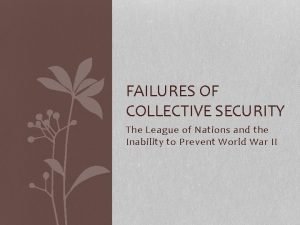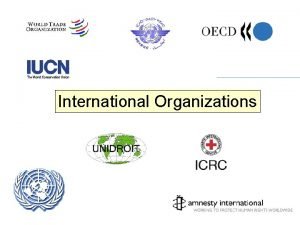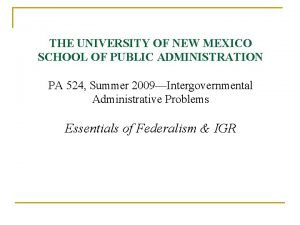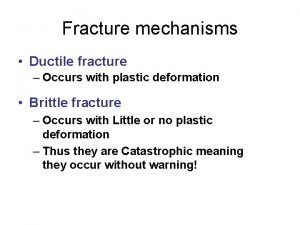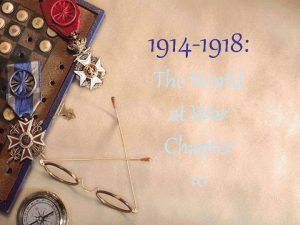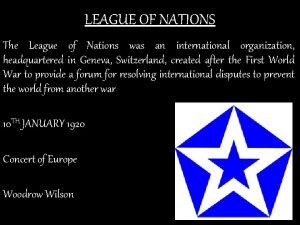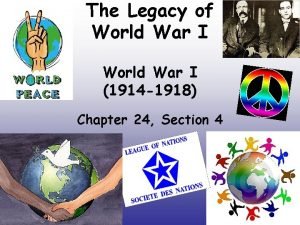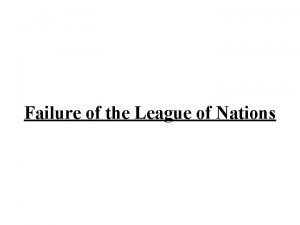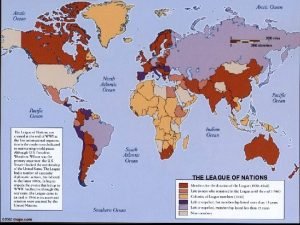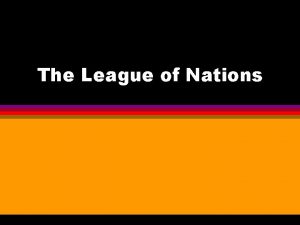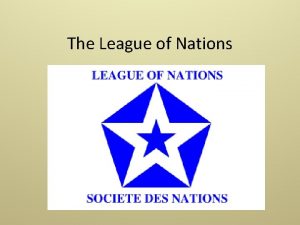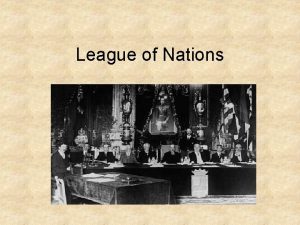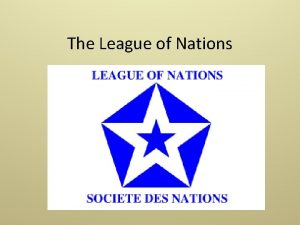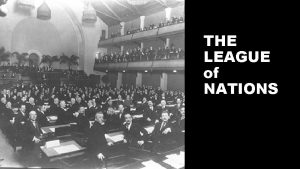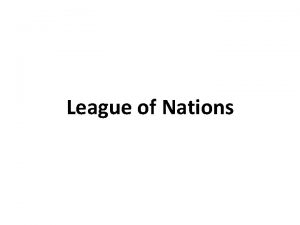Failure of the League of Nations Intergovernmental organization
















- Slides: 16

Failure of the League of Nations

§ Intergovernmental organization that was founded on January 10, 1920. § The organization came to be after the Paris Peace Conference that ended World War I § First ever international organization with the idea to maintain world peace § Focus was to prevent wars through collective security and disarmament § Determined to settle international disputes § Also looked over issues such as human and drug trafficking, treatment of indigenous people, arms trade, war prisoners, and more. § At its greatest extent from 28 September 1934 to 23 February 1935, it had 58 members

§ Also called the Versailles Peace Conference § Victorious Allies (British Empire, France, Russia, Japan, United States, and Italy) got together to determine the fate of the defeated Central Powers (Germany, Austria. Hungary, Ottoman Empire, and Bulgaria) § More than 32 countries attended § Signed the Treaty of Versailles – which would later be used by Hitler to spark German patriotism § The “Big Four” were leaders from British Empire (David Lloyd George), United States (Woodrow Wilson), France (Georges Clemenceau), and Italy (Vittorio Emanuele Orlando)


§ Even though the United States was one of the “Big Four” at the Paris Peace Conference, and even though they suggested the make the Lo. N, they did not join the organization. § Democratic President Woodrow Wilson wanted to join the Lo. N, but he needed the Congress to approve of his plan § Powerful opposition – Congress voted against joining the LON in 1919. § 1920 – Wilson had a stroke and became ill § March 1920 – congress vote NO again. § Democrats did not give up – they were convinced without the USA, there could be another World War. § 1920 election – Republicans campaigned for a ‘return to normalcy’ and for ‘isolationalism’. § League opened in January 1920 without the USA (who never joined).

§ Isolationism was a becoming a very common political belief during this time. § It is a policy of remaining apart from the affairs or interests of other groups, especially the political affairs of other countries § United States, especially with the Republicans and William Howard Thaft, believed that they should not get involved in other countries affairs, instead focusing on themselves. § Many other countries began to feel the same way after WWI

Image of a political cartoon, by Winsor Mc. Kay, characterizing the position of the United States if it joined the League of Nations.

§ Although it was a big failure in the 1930 s, it had some successes in its earlier days of conception: § Refugees: § 400, 000 POW’s were returned by the LON § 1922 - refugee crisis in Turkey- the LON helped people get housed and stamped out cholera and smallpox § Working Conditions: § Banned poisonous white lead from paint § Limited hours children were allowed to work for § Intro of a max 48 hour week – though only taken up buy a few members § Health: § The health committee worked hard to defeat leprosy § Global campaign to exterminate mosquitoes that caused yellow fever and malaria

§ The League of Nations in the 1930 s failed to prevent many different conflicts from going on, this created a lot of tension between nations, violence, political changes, and ultimately led to the second world war. § There were two main things the Lo. N did that allowed for these failures to continue: § 1. Non-intervention – is when one does not involve themselves with foreign affairs. § Ex. Did not want to get involved with the affairs of the Spanish Civil War § Kind of makes you think of being lazy § 2. Appeasement - is the act of giving into, or satisfying ones demands. § Ex. Let Hitler begin rearming Germany so he would not want to wage war § Kind of makes you think of being cowardly

§ It is important to remember that although there were some big players in the League of Nation, the organization did not have any army or navy of it’s own § There was no official Lo. N army, it was just whatever the different joined countries had and whether or not they wanted to use them § Without the United States and even Russia, they had so few powerful countries that could offer an army § United Nations today has it’s own Peacekeeping force that can be employed to particular international conflicts


§ This crisis = the fatal blow to the LON in 1935. § Similarities & differences to Manchurian crisis: § Like Japan, Italy was a leading member of the LON & Italy wanted to expand its Empire. § Unlike Manchuria; this was on the LON doorstep –bordered French & British colonies. § LON had claimed Manchuria was a special case, too far away – would Abyssinia be the same.

§ 1896 – Italian troops tried to invade Abyssinia – defeated by poorly equipped army of tribesmen. § Mussolini wanted revenge!! He also had his eye on the fertile land & mineral wealth. § He wanted the glory of conquest – restore the glory of Rome. § December 1934 – Italy leads it’s second invasion in Abyssinia.


The League lasted for 26 years; the United Nations (UN) replaced it after the end of the Second World War on 20 April 1946 and inherited a number of agencies and organisations founded by the League. §

§ http: //www. bbc. co. uk/schools/gcsebitesize/history/mwh/ir 1/leagueact. shtml
 Corfu incident league of nations failure
Corfu incident league of nations failure League of nations structure
League of nations structure Why did the league of nations fail
Why did the league of nations fail Why did the league of nations fail
Why did the league of nations fail Igo organisation
Igo organisation Enumerated powers definition ap gov
Enumerated powers definition ap gov Deil wright models of intergovernmental relations
Deil wright models of intergovernmental relations Intergovernmental grants department
Intergovernmental grants department Intergovernmental child support
Intergovernmental child support Failure to sense vs failure to capture
Failure to sense vs failure to capture Brittle vs ductile fracture
Brittle vs ductile fracture Capture beat
Capture beat League of nations 14 points
League of nations 14 points Whose idea was the league of nations
Whose idea was the league of nations League of nations
League of nations About the league of nations
About the league of nations Edu tr
Edu tr


